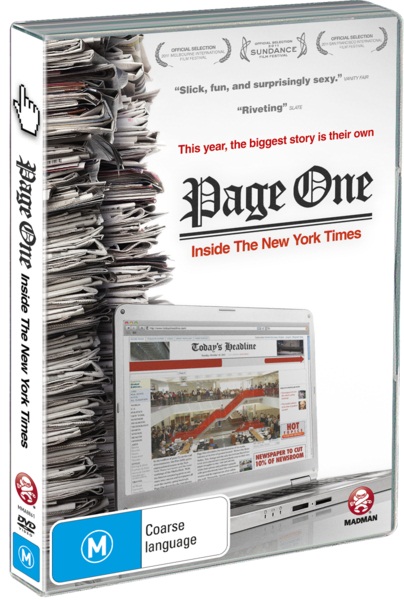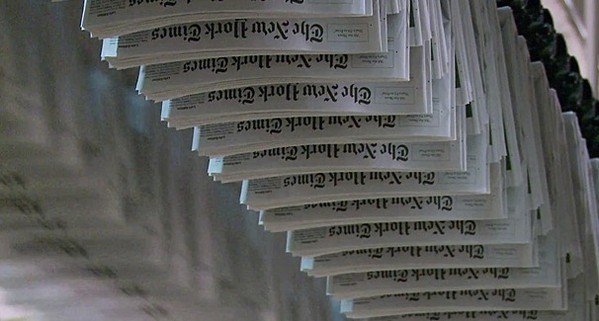
Page One: Inside the New York Times
Studio: History Films
Publisher: MADMAN
Release Date: December 14, 2011
Format: DVD
Price: $29.95 (available here)
Overview:
The internet has changed a lot of things. Changed how we communicate, how we access information, and most importantly for Page One, how we access and create news. A documentary focusing on the institution that is the New York Times, Page One attempts to cover all bases when it comes to the revolutionary fight that is print media versus the internet.
Content:
Directed by Andrew Rossi, Page One gains access to the newsrooms of one of the most famous publications in the world, with full access to editors and executives alike. The title comes from the ‘Page One meetings’, where the heads of the various news desks meet to decide what stories are worthy enough to make it to the front page. It’s something that the film has trouble with itself, never quite settling on it’s big issue or laying bare the real state of the industry with anything but opinion.
The headlines that it touches upon are interesting – there’s just never quite enough information or structure to make it feel like these things really matter beyond the run time of the film.
A printing press opening sequence lays bare the reality of printing a paper. Machinery, distribution networks, newsrooms, vendors, desks piled with paper and phones permanently ringing. It’s an interesting contrast to simple world of the internet where a single person can research, write and publish a piece without getting out of their chair, but unfortunately it’s one that’s never really capitalised on. There is some insight into the journalistic aspect of the paper, interesting and on the odd occasion entertaining, but the series of talking heads and news clips never rise above mildly entertaining.
Topics of discussion are mingled with the day to day running of the paper, quickly alighting on game changing ideas and developments without ever exploring their full impact. Segments on the iPad and Twitter bring nothing new or surprising to the table, we all know social media is instantaneous and incredibly dynamic, allowing people everywhere to create and respond to the news no matter their qualifications. Apple have created a really cool way to read that could be beneficial to the printed press. And? The New York Times runs the risk of going bankrupt, many other papers have already faced that reality – but all we are ever shown are a few redundancies, a few moments of the reality of a new type of media.
Thankfully WikiLeaks and it’s interaction with the more traditional press makes for far more interesting viewing, even if the subject at hand is still cut off just when things begin to get detailed. Julien Assange’s expose happy site makes from some intriguing interactions with the traditional media, and seeing how an institution like the New York Times deals with this source come publisher when the government becomes tangled up in the story could have been used for a lot more mileage.
Things are given a more human edge by David Carr, a one time crack addict now working for the New York Times. Carr feels like the only stable presence in the film, and following him to publishers conferences and TV panel shows gives Page One some much needed human grounding. He also provides the closest that Page One comes to an arc, with the camera following him through the process of publishing a story dealing with corporate scandal, complete with potential lawsuits, resignations and heated phone calls.
Carr is the highlight in an otherwise forgettable documentary. Whilst it runs Page One does an okay job of keeping your attention, but there’s little here to surprise or engage to the point that you’ll think about it for any length of time afterwards. The film is backed by the History Channel and very much feels like a television documentary – there’s no cinematic nature to the cinematography and little style to set it apart from the standard documentary.
Extras:
A theatrical trailer and some teasers for other Madman releases do little to make Page One more than a one sitting experience.
Overall:
Page One is at best mildly interesting. Those who already have some interest in journalism or media will have a passable distraction for an hour and a half, but when all is said and done there’s nothing here to make a lasting impression, no reason to revisit or to share. It commits the cardinal sin of not being very interesting or thorough, which for a documentary dealing with journalism is more than a little disappointing.




